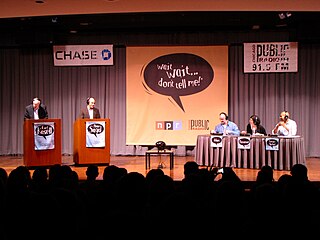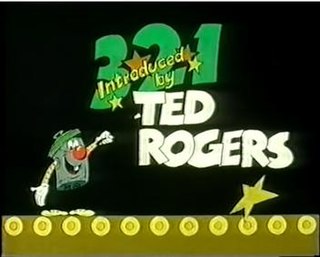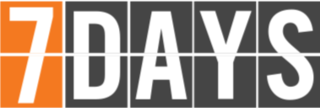
Have I Got News for You (HIGNFY) is a British television panel show, produced by Hat Trick Productions for the BBC, which premiered on 28 September 1990. The programme, loosely based on the BBC Radio 4 show The News Quiz, focuses on four panellists divided into two teams – captained by Ian Hislop and Paul Merton – answering questions on various news stories on the week prior to an episode's broadcast. However, the programme's format focuses more on the topical discussions on the subject of the news stories related to questions, and the satirical humour derived from these by the teams. As a result, the style of presentation had a profound impact on panel shows in British TV comedy, making it one of the genre's key standard-bearers.

A panel show or panel game is a radio or television game show in which a panel of celebrities participates. Celebrity panelists may compete with each other, such as on The News Quiz; facilitate play by non-celebrity contestants, such as on Match Game and Blankety Blank; or do both, such as on Wait Wait Don't Tell Me. The genre can be traced to 1938, when Information Please debuted on U.S. radio. The earliest known television panel show is Play the Game, a charades show in 1946. The modern trend of comedy panel shows can find early roots with Stop Me If You've Heard This One in 1939 and Can You Top This? in 1940. While panel shows were more popular in the past in the U.S., they are still very common in the United Kingdom.

QI is a British comedy panel game quiz show for television created and co-produced by John Lloyd. The series currently airs on BBC Two and is presented by Sandi Toksvig. It features permanent panellist Alan Davies and three guest panellists per episode who are mostly comedians. The series was presented by Stephen Fry from its beginning in 2003 until 2016.

3–2–1 was a British game show that was made by Yorkshire Television for ITV. It ran for ten years, between 29 July 1978 and 24 December 1988, with Ted Rogers as the host.

Good News Week is an Australian satirical panel game show hosted by Paul McDermott that aired from 19 April 1996 to 27 May 2000, and 11 February 2008 to 28 April 2012. The show's initial run aired on ABC until being bought by Network Ten in 1999. The show was revived for its second run when the 2007–2008 Writers Guild of America strike caused many of Network Ten's imported US programmes to cease production.

Spicks and Specks is an Australian music-themed comedic television quiz show. Hosted by Adam Hills and with team leaders Myf Warhurst and Alan Brough, the series originally aired on what was then ABC1 at 8:30pm on Wednesday nights, with the show repeated on Thursdays on ABC2 at 8pm. The previous year's season was repeated every Friday at 2:30pm on ABC1. As of 2021, repeats of old episodes of the show screen at 7:30pm weeknights on ABC TV Plus.

Mock the Week is a British topical satirical celebrity panel show, created by Dan Patterson and Mark Leveson – the co-producers of Whose Line Is It Anyway? – produced by Angst Productions for BBC Two, and premiered on 5 June 2005. The programme is presented by Dara Ó Briain and features regular appearances by comedian Hugh Dennis, as well as guest appearances by a variety of stand-up comedians, some of whom had regular appearances across several series.

Sweat the Small Stuff is a British comedy panel show broadcast on BBC Three, presented by Nick Grimshaw and featuring team captains Melvin Odoom and Rochelle Humes. Humes, formerly a regular panellist, replaced Rickie Haywood Williams, who was a team captain in series 1.
They Think It's All Over is a British comedy panel game with a sporting theme produced by Talkback and shown on BBC1. The show's name was taken from Kenneth Wolstenholme's famous 1966 World Cup commentary quotation, "they think it's all over...it is now!" and the show used the phrase to sign off each episode. In 2006 the show's run ended after 11 years on air.

Insert Name Here is a British comedy panel game show presented by Sue Perkins. The programme made its debut on BBC Two on 4 January 2016. In each episode two teams of three compete to answer questions about famous people, past and present, who have just one thing in common: they share the same name. The team captains are Josh Widdicombe and Richard Osman. The show was canceled in February 2020 due to low viewership.
If I Ruled the World is a television show aired in the United Kingdom in 1998 and 1999. It was a comedy panel game show, similar to Have I Got News for You but focused on parodying the behaviour of politicians. Rounds included answering questions without using the words 'Yes' or 'No', and finding reasons to disagree with policies proposed by the other team, no matter how sensible. The winning team was chosen each week by a vote of the studio audience. The show was named after the 1960s theatre song "If I Ruled the World".

Only Connect is a British television quiz show presented by Victoria Coren Mitchell. In the series, teams compete in a tournament of finding connections between seemingly unrelated clues. The title is taken from a passage in E. M. Forster's 1910 novel Howards End: "Only connect the prose and the passion, and both will be exalted".

Pointless is a British television quiz show produced by Banijay subsidiary Remarkable Television for the BBC. It is hosted by Alexander Armstrong with assistance from Richard Osman. In each episode four teams of two contestants attempt to find correct but obscure answers to four rounds of general knowledge questions, with the winning team eligible to compete for the show's cash jackpot. All questions used on the show are factual in nature, and are asked of a panel of 100 individuals in a pre-conducted public survey. A correct answer scores one point for each survey subject who gave it, and the objective is to achieve as low a score as possible. "Pointless" answers, correct responses that were not given by anyone surveyed, score zero points and are the most desirable. Every pointless answer given during the main game increases the jackpot by £250, and the team that reaches the final round has three chances to win it by giving one such answer.

7 Days is a New Zealand comedy gameshow similar in some ways to the British program Mock the Week, hosted by Jeremy Corbett and created by thedownlowconcept. Paul Ego and Dai Henwood usually appear on each episode, along with other comedians, who form teams and answer questions about stories from the last week.
Cleverdicks was a British television quiz show for Sky Atlantic, hosted by Ann Widdecombe. Running for 30 episodes, it was later repeated on Challenge. Four contestants competed in each episode for the right to call themselves "cleverdicks" and play for a roll-over cash jackpot. As explained by Widdecombe at the beginning of the first episode, a cleverdick is a person who is "irritatingly and ostentatiously knowledgeable or intelligent." The question material was therefore primarily academic in nature.

Have You Been Paying Attention? is an Australian panel game television quiz show on Network 10. The series, which is produced by Working Dog Productions, is a mix of news and comedy which sees host Tom Gleisner quiz five guests on the week's top news stories.
Richard Osman's House of Games is a British quiz show produced by Banijay, a branch of Remarkable Television, for the BBC, hosted by Richard Osman. The show is played on a weekly basis, with four celebrities playing on five consecutive days to win daily prizes and the weekly prize of being crowned as "House of Games" champion. Points are accrued depending on where each celebrity finishes on each day and the points are doubled on Friday's show.
Think Tank is an Australian television quiz show based on the British program of the same name. It premiered on the ABC on 5 February 2018 and is hosted by Paul McDermott.
Campus Challenge is a Philippine television quiz show broadcast by UNTV. The show ran continuously every Sunday for 4 seasons beginning August 14, 2011, until it concluded on April 28, 2013. It was hosted by then-MTV VJ Jonathan "Sib" Sibulo and then-Miss Air Philippines 2018 Zahra Bianca Saldua.











